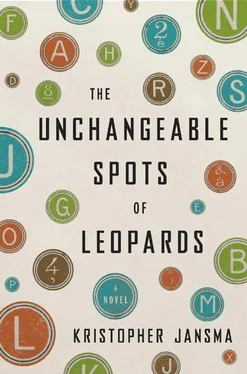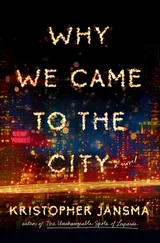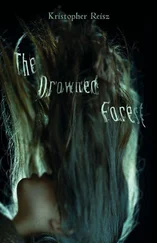“You’re not reading ,” the boy complains.
“Sorry,” I say, “I thought you weren’t ready.”
“I’m ready,” he insists.
“Oh, this one’s a good one,” I say as I flip a few stories in. I pause, remembering that I read it once, when I was little, at a tiny bookstore in a big airport terminal. I’m delighted to find it hasn’t changed at all — only me. King me.
“You have to say its name,” he demands.
“Its name,” I say, “its name is, ‘How the Leopard Got His Spots.’”
• • •
I left Luxembourg and my apologies, scrawled onto the blank end pages of the Kipling book. I’d come looking for someone I’d made up, a long time ago, and that as fun as it might have been to break character for another night, I owed her more than that — much more. For years we’d had a kind of make-believe love, in its way so much better than the genuine article. She’d called me after good auditions, but never bad ones. I’d seen her break men’s hearts, but I’d never once seen her heartbroken. Our story had been all romanticism, never realism. We’d had affairs, but we’d never once made plans. Now I saw that, even playing the role of the Princess of Luxembourg, she had no fairy-tale life: she had a country to think of, overweight citizens to inspire to exercise, real duties to carry out! A royal life was still a life: soy products to endorse, a husband to miss when he was away, and children getting up to mischief on opposite ends of the palace. Running away from it all for just one night would have made neither of us any happier, in the end. If Jeffrey had proved anything to me, it was that no one could escape forever. Maybe he’d been right, long ago, when he’d told me that I’d never really loved her. Nothing I’d felt for her then even began to match what I felt when she’d looked that child in the eye and had seen her own eyes looking back.
Of course, I didn’t say all that, exactly. Rather, I left my apologies in the form of a story. One that I’d written again and again, about an actress preparing for not merely the role of a lifetime — but a lifetime of a role. A story I’d been unable to finish, until then. When I’d finally finished it, I’d signed my name — my real name — at the bottom, and set the book down beside the sleeping head of her son.
Now, on this airplane, I am writing it all again, while I soar over the great black gap of the ocean, in as straight a line as the curve of the earth will allow. A flight attendant reminds me sweetly to be sure and change the time on my watch. I tell her that I wish I still had a watch. I tell her that I so loved watching its hands winding backward, making time where there was none before, catching seconds from the air and putting them back where they belong.
The sun is rising fast in the east behind us, but we are faster. Everything stays dark, as if the night itself were trying to take longer, so I can finish. I write until the instructions come to put my table in the upright position. Then, as we descend, I keep on going, pressing hard against the back of the seat in front of me. Just before our wheels touch the ground, I, at last, am finished.
Careful not to crease the folds of my white shiromuku wedding robes, I sit down again and reach into my bag one last time. From inside a silk-lined cavity I withdraw a small painting, about the size of a page in a book, of a woman rendered entirely in gold. The fluid lines, the precise strokes, can only have been painted by someone imbued with a great and unabating passion. In the glint of the woman’s breasts I can trace the serene gaze of its unknown artist. And just to the left of this there is a small smudge — a faint oily spot left behind by the pressing of a single finger.
It took me some time to find the portrait, on loan to a private collection at a North Carolina art museum. When the owners noticed the finger smudge, they were aghast, and offered to lower the price or have it professionally restored. But I would not allow it. I want the smudge, I’d said. Get rid of everything else if you want. It’s the smudge I want.
I stare at this single, oily spot as I have every night before going on stage. And after a few moments I am prepared. I rise from my seat by the dressing mirrors and adjust my wedding robes one last time. I pass through the doors of the dressing room and I am on a stage. The curtain has fallen and I can hear the roar of the crowd building, steadily, like a madness. The snow is still drifting down in the dark space before me. Up in the catwalks, some stagehands scurry with last-minute tasks. I am my role. The curtain stirs gently in the draft. And when it goes up, I will feel that one face — those two eyes — that gaze I must avoid all night. But I will feel those eyes watching, every moment, knowing I can never look back into them, because they would undo me.
The wait is over now. The curtain begins to rise.
“Lowly faithful, banish fear, / Right onward drive unharmed; / The port, well worth the cruise, is near / And every wave is charmed.”
— RALPH WALDO EMERSON, “TERMINUS”
Here again, she tells herself. She reaches the top of the escalator, yanking her suitcase by its taped handle to keep it from catching in the mechanism. The sides of her case are freshly smudged with red sub-Saharan dust. This same dust is caught in the lengths of her auburn hair and pressed into the pale swirls of her fingertips. Just as it had been the last time she’d passed through this very same airport terminal. Here again, she tells herself, and again empty-handed.
Through a barrage of static, the speakers above her head announce, “Boarding will… in just a moment for… two thirty-seven to New York City.”
She peers quickly around Terminal B for a clock but cannot locate one anywhere. She certainly does not notice him, over at the farthest table — the man fussing about with stacks of pages: dividing them into parts, ordering, reordering, deleting, stetting. Hesitatingly he scribbles question marks onto the wide, clean margins, branding them with each of his infinite doubts. She doesn’t see how aggravated and nervous he is, or how completely exhausted. Everything that was inside of him has been emptied except the overwhelming fear that what’s been emptied is nothing special. He thought that he would be much surer by this point. He knows that there is so much missing — so much that he’s lost and will never be able to find. He worries that perhaps they are all the wrong words. He thinks that perhaps they are all in the wrong order. He wonders if perhaps those who read them won’t be able to see all that they should.
But really he is lying only to himself, again. Really, his fear is just the opposite. Really, he’s worried that maybe they will see — all the terrible things that he has done and has been. He’s thinks that he has changed his spots — he’s sure he has — but now everything is in there: the lies he’s told and the truths he’s invented.
But she doesn’t notice him. She’s still pacing up and down the terminal, looking for a clock, but there are none to be found. Not near the Emerson Books. Not across the corridor by Phil’s Coffee Hub, or W. W. Gould’s Good Eats, or the Jewels, Jewels, Jewels! kiosk. She knows only that it is far too early in the morning, but that to her it feels like the depth of night. She hates taking the red-eye back to the city. She hates arriving into its jubilant, awakening arms feeling so deeply burned out. She continues, legs cramped and stiff, the little wheel on her bag squealing incessantly.
The bag’s wheel had a bad encounter with a busted step at the old man’s house — the axis knocked a few degrees off balance when she was racing inside to try to catch the end of his estate auction. She’d been so sad to hear he’d passed. She’d never even gotten to meet the great Jeremiah; she’d never been allowed. And after so much anticipation, she’d shown up very, very late. Kojo’s rusted Hyundai had blown a tire, hours earlier, and she had been forced to wait out there in the miserable heat while he walked to the nearest village to scrounge up a replacement. By the time she’d gotten inside the old man’s house, nearly everything had already been sold. She’d soon spotted an editor from Sandford Books, locking up a briefcase filled with yellowed pages. Early stories? Diaries? Letters? She still doesn’t know. Like the rest of the world, she will have to wait and wonder and see.
Читать дальше











